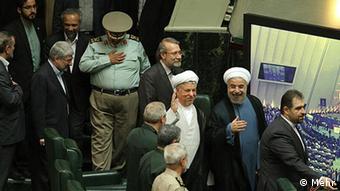US military strike in Syria will have repercussions across the region, and will
certainly raise hackles in Iran. But ultimately, say analysts, Tehran will call
the West's bluff, as it always does.
After last week's horrific chemical attack on civilians in Syria, it felt
like the US and its allies had no option but to take military action against
President Bashar al-Assad's regime. President Barack Obama's famous "red line"
declaration - made almost exactly a year ago - about the use of chemical or
biological weapons had now undeniably been crossed.
While analysts agree that any US strike against Syria will likely be relatively limited - possibly a single cruise missile strike against a government building in Damascus - even the most "symbolic" attack could have serious consequences for the region.
Hayder al-Khoei, researcher at the UK-based Center for Academic Shi'a Studies, agrees: "I fear a strike will only reinforce the belief that Western powers are taking sides in a brutal sectarian conflict that is having ramifications well beyond Syria itself."
Iran issue
One country where the reaction could be especially volatile is Iran, Syria's closest regional ally and perennial enemy of the US. Iran's recent election brought a surprise "moderate" candidate to the presidency, Hassan Rouhani, who many believe is keen to open talks with the West in an attempt to relieve Iran's international isolation.
"But if we have an American attack on an Iranian ally, then the hawks in Tehran will say, 'You must not deal with the Americans, and we must have our nuclear weapons,'" said Rogers. "And that's much more difficult to figure out."
Arshin Adib-Moghaddam, reader in International Relations at the University of London and author of a forthcoming book "On the Arab revolts and the Iranian revolution," thinks that effect on Iran's internal politics will be limited, but that doesn't make an attack on Syria a good idea.
Al-Khoei put it even more bluntly: "An Iranian cleric recently told me, 'If Assad falls, the Iranians will march on foot to Syria.'"
Impotent America
But Walter Posch, Iran expert at the German Institute for International and Security Affairs (SWP), is unconvinced that the consequences would be so dramatic. "It seems to me that the Iranians have been informed, or that there is some kind of indirect communication between the US and Iran via the Sultan of Oman," he said. "Two days ago, the sultan was in Iran, and he had a long, long discussion with the Supreme Leader about security in the region."
Posch thinks that the Iranian regime are cannier diplomats than they are given credit for, and actually care little about a hypothetical military strike. "There will be the standard condemnation, but so what? What are you going to bomb anyway?" he said. "You're bombing Damascus? It's already bombed. There's not much left of it. [Syria] was always a well-maintained balance between Iran and Saudi Arabia. Whatever is going on now, all this conflict has a sectarian coloring. If it's about inner-Islamic conflict, do you really think that the West has a lot to say there?"
In fact, as far as Posch can see, the US is fully aware of its impotence in the Middle East. "Obama knows that there is nothing he can do there," he said. "We know now that after a military attack, the Americans can neither control a country, nor can they impose their will on its policy. Have a look at Libya."
Plan B
Iran, he added, will of course stay true to Assad in public. "They will complain, they will protest, but they will avoid a confrontation with the US and the Europeans - they're going to ride it out," he said. "They would prefer Assad to stay in power, of course, but they already have a plan B."
Posch also suggested that Iranian public opinion is not particularly devoted to Assad. "Most of them think, 'what are we doing with this very Arab country?'" he said. "The good Muslims think it's actually a disgrace to be in cahoots with someone from the Baath party who has been suppressing Islam all the time. There is only the vested interest of the security apparatus - those people think they need Assad and Syria and Hezbollah to put the pressure on Israel. That's an important constituency, and it includes the Supreme Leader, but basically the people in Iran, no. Some of them will panic, but by and large I don't think there will be any big reaction."
And ultimately, he concluded, the Iranian leadership will learn to live without Assad. "They will say, 'So Assad is gone, what next?' That's what they always do. If you come with a show of force to the Iranians, they usually call your bluff. And they've got away with it until now."
While analysts agree that any US strike against Syria will likely be relatively limited - possibly a single cruise missile strike against a government building in Damascus - even the most "symbolic" attack could have serious consequences for the region.
Some think
President Rouhani's position will be weakened if the US strikes Syria
"Once you get any kind of action like this, it's far less easy to predict
what will happen then," Paul Rogers, security analyst for UK think tank Oxford
Research Group, told DW. "In the wider Middle East, even if it's a symbolic
raid, it will be seen as one more example of the West interfering."Hayder al-Khoei, researcher at the UK-based Center for Academic Shi'a Studies, agrees: "I fear a strike will only reinforce the belief that Western powers are taking sides in a brutal sectarian conflict that is having ramifications well beyond Syria itself."
Iran issue
One country where the reaction could be especially volatile is Iran, Syria's closest regional ally and perennial enemy of the US. Iran's recent election brought a surprise "moderate" candidate to the presidency, Hassan Rouhani, who many believe is keen to open talks with the West in an attempt to relieve Iran's international isolation.
"But if we have an American attack on an Iranian ally, then the hawks in Tehran will say, 'You must not deal with the Americans, and we must have our nuclear weapons,'" said Rogers. "And that's much more difficult to figure out."
Arshin Adib-Moghaddam, reader in International Relations at the University of London and author of a forthcoming book "On the Arab revolts and the Iranian revolution," thinks that effect on Iran's internal politics will be limited, but that doesn't make an attack on Syria a good idea.
The US is
ultimately impotent in the Middle East, thinks Posch
"It won't necessarily weaken him domestically, but it would make it that much
more difficult to engage Iran," he told DW. "A war against Syria would be
another great strategic folly."Al-Khoei put it even more bluntly: "An Iranian cleric recently told me, 'If Assad falls, the Iranians will march on foot to Syria.'"
Impotent America
But Walter Posch, Iran expert at the German Institute for International and Security Affairs (SWP), is unconvinced that the consequences would be so dramatic. "It seems to me that the Iranians have been informed, or that there is some kind of indirect communication between the US and Iran via the Sultan of Oman," he said. "Two days ago, the sultan was in Iran, and he had a long, long discussion with the Supreme Leader about security in the region."
Posch thinks that the Iranian regime are cannier diplomats than they are given credit for, and actually care little about a hypothetical military strike. "There will be the standard condemnation, but so what? What are you going to bomb anyway?" he said. "You're bombing Damascus? It's already bombed. There's not much left of it. [Syria] was always a well-maintained balance between Iran and Saudi Arabia. Whatever is going on now, all this conflict has a sectarian coloring. If it's about inner-Islamic conflict, do you really think that the West has a lot to say there?"
In fact, as far as Posch can see, the US is fully aware of its impotence in the Middle East. "Obama knows that there is nothing he can do there," he said. "We know now that after a military attack, the Americans can neither control a country, nor can they impose their will on its policy. Have a look at Libya."
Plan B
Iran would
prefer Assad to stay in power, but are preparing for life without him
Iran knows this too, and has learnt from its experience in Iraq, that the
West's influence can be wrested from it. "Iran is already preparing what to do
after the fall of Assad, when things really start," Posch said. "Building up
militias at a local level. When Assad is gone, the civil war may just go into
another phase."Iran, he added, will of course stay true to Assad in public. "They will complain, they will protest, but they will avoid a confrontation with the US and the Europeans - they're going to ride it out," he said. "They would prefer Assad to stay in power, of course, but they already have a plan B."
Posch also suggested that Iranian public opinion is not particularly devoted to Assad. "Most of them think, 'what are we doing with this very Arab country?'" he said. "The good Muslims think it's actually a disgrace to be in cahoots with someone from the Baath party who has been suppressing Islam all the time. There is only the vested interest of the security apparatus - those people think they need Assad and Syria and Hezbollah to put the pressure on Israel. That's an important constituency, and it includes the Supreme Leader, but basically the people in Iran, no. Some of them will panic, but by and large I don't think there will be any big reaction."
And ultimately, he concluded, the Iranian leadership will learn to live without Assad. "They will say, 'So Assad is gone, what next?' That's what they always do. If you come with a show of force to the Iranians, they usually call your bluff. And they've got away with it until now."




No comments:
Post a Comment